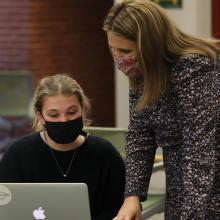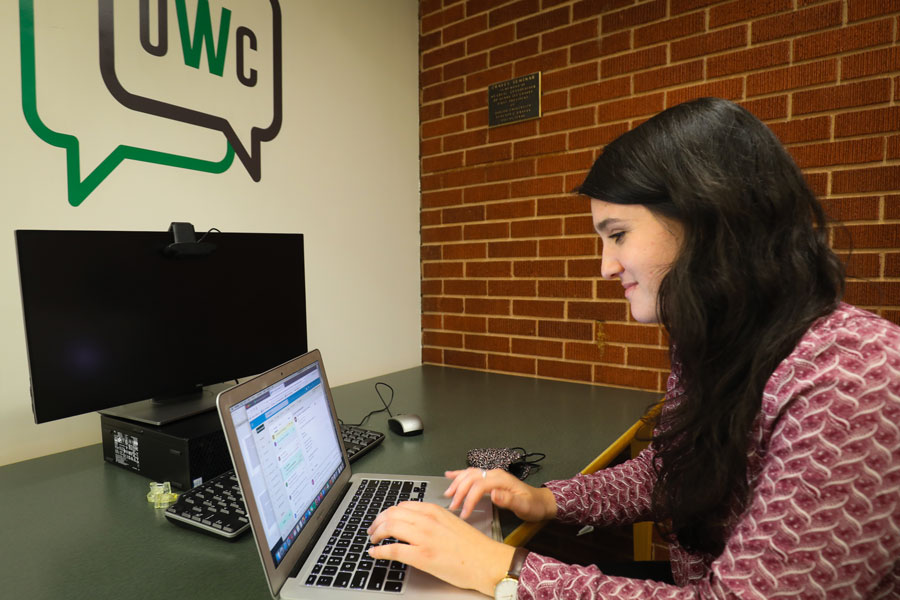All the Write Stuff
This is another in a series of stories examining the purpose and contributions of the academic centers and institutes within the Baylor University College of Arts & Sciences. In the profile, we look at the University writing Center, under the direction of Dr. Kara Poe Alexander.
Although the University Writing Center (UWC) is funded by the College of Arts & Sciences, the services it provides are available for free to all Baylor students. At the Center, located on the second floor of Moody Memorial Library, tutors sit across the table from their clients to counsel and advise them on anything that involves the written or spoken word. This includes class projects, such as essays, research papers, lab reports, literature reviews, posters, brochures, audio and video projects and oral presentations. It also can include career-related needs — job applications, résumés and cover letters — and major academic writing projects, such as theses, dissertations and grant applications.
Tutors in the UWC are undergraduate or graduate students who have undergone rigorous training, and their clients are referred to as “writers,” Dr. Kara Poe Alexander, director of the Writing Center said.
“We call them ‘writers’ to give them agency, and to show a relationship that’s more equal between the tutor and the writer, because the writer comes with a lot of expertise and knowledge in their own discipline and in what they’ve written about,” Alexander said.
Keeping Busy
The UWC handles approximately 2,000 appointments per semester, with an average of 61 appointment slots each day. Most appointments are prompted by specific assignments.
“We have some writers who come and see us every week, so they make a recurring appointment and see the same tutor every week,” Alexander said. “And then we have other writers who come in with every paper — maybe three to four times a semester — while some people come only once.”
Individual tutoring sessions are limited to 50 minutes to keep things moving and prevent fatigue on both sides of the table. After every appointment, the tutor sends session notes to the student and to their professor as well, if the student wishes, or if such notes are required for a class.
“Usually, the writers come by themselves, and their professors likely have encouraged it to the whole class or they’ll have it in the syllabus,” Alexander said. “We don’t get a lot of professors telling a student, ‘You need to go to the writing center.’”
No Fix-it Shop
But what if students just need a very quick, last-minute scan to catch any unseen errors in their document — sort of like a human, on-demand version of spellcheck or Grammarly? Sorry — students should not expect the UWC to be a “fix-it” shop for their papers at the last minute,” said Dr. Lauren Short, a lecturer in English who serves as the Center’s assistant director.
“Those situations where procrastination is happening are obviously stressful for the writer and for the tutor,” she said. “I always encourage our tutors to gently remind the writer, ‘If next time you know that you have an assignment due, if you think about it and plan to come in a little bit earlier, you’ll have more time to reflect on the feedback that we’ve talked about and implement those changes.’”
That feedback is structured on a “hierarchy of concerns,” Alexander said.
“It is helpful to examine the argument, evidence and organization at early stages of writing because if that changes, the words and sentences will change, too,” Short said. “There’s not much point to focus on grammar and spelling if the larger issues have big problems.”
Well-trained Tutors
A key to keeping the work of the Writing Center going smoothly is having well-trained tutors. In the spring of 2021 the UWC employed 21 tutors, including seven graduate students. Any student can apply, and a course called “Tutoring Writing” is recommended if they want extra training. If accepted, they must read scholarly articles, watch training videos, attend staff meetings, observe other tutors and be observed themselves before they are ready to tutor on their own.
“You have to be trustworthy and friendly and present yourself as that in a split second. It’s a very personal thing for a writer to show someone else what they’re doing, and it’s an even more personal thing for them to accept criticism on this thing they have worked on. So, a tutor really has to be able to build that relationship with their students and know this is what they need.”Elizabeth Velasquez
“We want tutors from across the University, from all different disciplines, because that helps our students and it also helps spread the word about us,” Alexander said.
Elizabeth Velasquez, who worked as a Writing Center tutor for three years before she graduated from Baylor, said her relationships ranged from peer-to-peer to mentor, as she helped with everything from the first papers written as a freshman to the final drafts of doctoral dissertations. She said gaining the trust of her clients was the first step toward success.
“You have to be trustworthy and friendly and present yourself as that in a split second,” Velasquez said. “It’s a very personal thing for a writer to show someone else what they’re doing, and it’s an even more personal thing for them to accept criticism on this thing they have worked on. So, a tutor really has to be able to build that relationship with their students and know this is what they need.”
Velasquez said the UWC’s emphasis on collaboration is also important.
“I really tried to impress upon my students that writing is not a solitary endeavor, and in whatever relationship we come into that, they know we’re in this together and we’re working on this piece of writing collaboratively,” she said. “The relationships I had with each student were always different, but they were always gratifying.”

